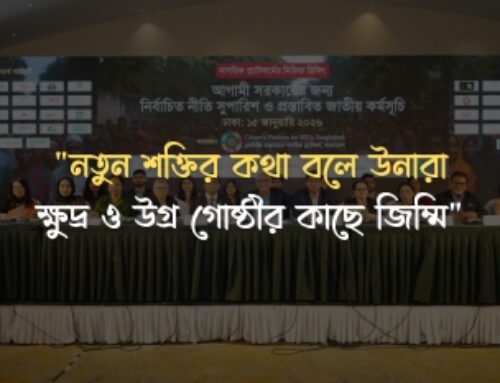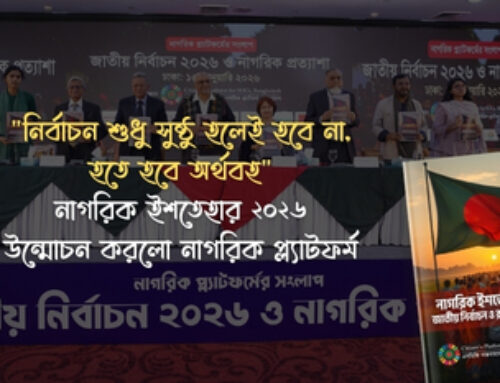Who are being left out from the development outcomes in Bangladesh? Identifying these groups of population is critical as we conceptualise the marginalisation process in the country. The issue has acquired heightened importance as we try to address the concern that “no one will be left behind” in our economic, social and environmental plans and programs. This maintained that marginalisation results from lack of effective access to opportunities. However, may also occur due to nature of occupation, locational attributes, identity challenges, often afflicts a group, thus making prioritisation more challenging in the context of policy interventions. These aspects were emphasised at a validation meeting on the findings of a recent research study undertaken by Manusher Jonno Foundation (MJF). MJF partnered with Citizen’s Platform for SDGs, Bangladesh to hold this event on 6 April 2017 at the BRAC Centre, Dhaka.
Mr. M A Mannan, MP, Hon’ble State Minister, Ministry of Finance has kindly graced his presence as the Chief Guest while Dr. Samsul Alam, Member (Senior Secretary), General Economic Division, Planning Commission, Ministry of Planning; attended as the Special Guest. Sir Fazle Hasan Abed, Founder and Chairperson, BRAC was the Guest of Honour. Ms. Shaheen Anam, Executive Director and Selim Ahmed Parvez, Senior Programme Manager, MJF presented the keynote. Discussants for the event were Dr. Amena Mohsin, Professor, Department of International Relations, University of Dhaka and Dr Kazi Ali Toufique (Lintu), Research Director, BIDS. The session was chaired by Dr Debapriya Bhattacharya, Convenor of the Citizen’s Platform and Distinguished Fellow, CPD.
Sharing the findings of a study, Ms Shaheen Anam, Executive Director, highlighted on the dominance of a political economic situation that creates a sustained state of marginalisation, for group of people by deliberately denying their rights and opportunities. The study found that average literacy rate is 28.4% among the marginalised communities (where the religious minority groups have the lowest literacy rates at 18.7% compared to the sex workers who have the highest literacy percentages at 39.5%). Conversely, 91% of the religious minorities and 56% of the sex workers seek education services but only 26% and 8% (respectively) receives substantial ones. On the other hand, almost 98% of the sex workers, 82% of the religious minorities and 96% of the tribes (residing on the plain lands) are involved with informal employment.
 The study also shared that on average 33.9% of the households become victims of physical violence (mostly the sex workers at 52.2% while 21% of the religious minorities suffer various forms of violence). A larger portion of 41.5% households reported that violence occurred due to their lower positioning in the society and also 37% of the religious minorities perceived that violence occurred when the majority groups exercise power. However, around 34.2% perceived that violence occurs due to weak implementation of laws and policies. It further reflected from the household survey that there were occurrences of 14 rape and 4 trafficking cases.
The study also shared that on average 33.9% of the households become victims of physical violence (mostly the sex workers at 52.2% while 21% of the religious minorities suffer various forms of violence). A larger portion of 41.5% households reported that violence occurred due to their lower positioning in the society and also 37% of the religious minorities perceived that violence occurred when the majority groups exercise power. However, around 34.2% perceived that violence occurs due to weak implementation of laws and policies. It further reflected from the household survey that there were occurrences of 14 rape and 4 trafficking cases.
In response to her findings, Ms. Anam shared that the three actors (state, market and society) creates a world of injustice for the people who do not have representation (voice) in decision making. In most of the cases State is unaccountable. Market has lack of interest or finds less alignment to social affairs, and Society causes stigma and exclusion from acquiring economic benefits.
Dr Amena Mohsin, Professor, Department of International Relations, University of Dhaka, and Dr Kazi Ali Toufique, Research Director, BIDS, were the discussants at the session. Dr Mohsin drew attention to the lack of voice, power and institutional representation that creates an identity crisis. On the other hand, Dr. Toufique focused on the technical side of the research findings, particularly on the sampling techniques. He sought for a working definition when identifying marginalised groups. Suggestive definition was based on the $1 per capita income poverty definition. Anyone below the poverty line will be considered maginalised while suffering from multiple vulnerabilities.
The Chief Guest for the event, Mr M A Mannan, MP, Hon’ble State Minister, Ministry of Finance and Planning, was hopeful about breaking the old molds of social repression. He said the government has over the years created policies in favour of marginsalised communities including dalits, third gender, and the disabled. In the upcoming budget, government intends to raise allocation of social safety net for the dalit communities in particular, and also create equitable education access for their children.

Dr Shamsul Alam, Member (Senior Secretary), General Economic Division, Planning Commission, Ministry of Planning, was present as the Special Guest. He advised all the deprived communities to raise their self-esteem as human beings, then only, one can defeat (come out from the wraths of) identity crisis. He also shared that all the national social strategy documents including the 7th Five Year Plan have recognised most of the marginalised groups and stated policies for overcoming their structural barriers.
Dr Debapriya Bhattacharya, Convenor of the Citizen’s Platform, and Distinguished Fellow of CPD, in his concluding remarks called upon the government to enact the “Anti-discrimination Act”, so as to provide legal and regulatory basis for policy interventions addressing various kinds of vulnerabilities prevalent in the country. He emphasised that policy interventions have to take note of whether the vulnerabilities are results of shocks or policies. He also pointed out that the market has to make space for the vulnerable groups. In addition, further giving voice to the left behind people, society has to ensure justice for them.





